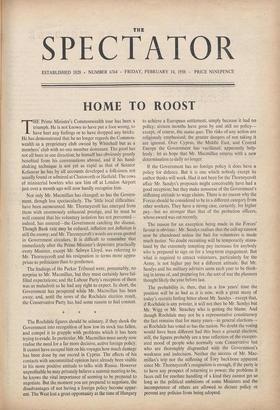HOME TO ROOST
THE Prime Minister's Commonwealth tour has been a triumph. He is not known to have put a foot wrong, to have hurt any feelings or to have dropped any bricks. He has demonstrated that he no longer regards the Common- wealth as a proprietary club owned by Whitehall but as a members' club with no one member dominant. The good has not all been in one direction; he himself has obviously greatly benefited from his conversations abroad, and if his hand- shaking technique is not yet as rapid as that of Senator Kefauver he has by all accounts developed a folksiness not usually found or admired at Chatsworth or Hatfield. The rows of ministerial bowlers who saw him off at London Airport just over a month ago will now hardly recognise him.
Not only Mr. Macmillan has changed; so has the Govern- ment, though less spectacularly. The 'little local difficulties' have been surmounted. Mr. Thorneycroft has emerged from them with enormously enhanced prestige, and he must be well content that his voluntary isolation has not prevented— indeed, has ensured—the Government catching the disease. Though Bank rate may be reduced, inflation not deflation is still the enemy; and Mr. Thorneycroft's words are even quqted in Government circulars. It is difficult to remember that immediately after the Prime Minister's. departure practically every Minister, except Mr. Selwyn Lloyd, was referring to Mr. Thorneycroft and his resignation in terms more appro- priate to politicians than to gentlemen.
The findings of the Parker Tribunal were, presumably, no surprise to Mr. Macmillan, but they must certainly have ful- filled expectations; and the Labour Party's reception of them was as maladroit as he had any right to expect. In short, the Government has prospered while Mr. Macmillan has been away; and, until the news of the Rochdale election result, the Conservative Party has had some reason to feel content.
The Rochdale figures should be salutary, if they shock the Government into recognition of how low its stock has fallen, and compel it to grapple with problems which it has been trying to evade. In particular, Mr. Macmillan must surely now realise the need for a far more decisive, active foreign policy. It cannot have escaped him on his voyages how much damage has been done by our record in Cyprus. The effects of his contacts with uncommitted opinion have already been visible in his more positive attitude to talks with Russia. However unprofitable he may privately believe a summit meeting to be, he knows the vital importance of seeming to be prepared to negotiate. But the moment you are prepared to negotiate, the disadvantages of not having a foreign policy become appar- ent. The West lost a great opportunity at the time of Hungary to achieve a European settlement, simply because it had no policy; sixteen months have gone by and still no policy— except, of course, the status quo. The risks of any action are religiously emphasised; the greater dangers of not taking it are ignored. Over Cyprus, the Middle East, and Central Europe the Government has vacillated, apparently help- lessly : let us hope that Mr. Macmillan returns with a new determination to daily no longer.
If the Government has no foreign policy it does have a policy for defence. But it is one which nobody except its author thinks will work. Had it not been for the Thorneycroft affair Mr. Sandys's proposals might conceivably have had a good reception; but they make nonsense of the Government's stiffening attitude to wage claims. There is no reason why the Forces should be considered to be in a different category from other workers. They have a strong case, certainly, for higher pay—but no stronger than that of the probation officers, whose award was cut recently.
The reason for an exception being made in the Forces' favour is obvious : Mr. Sandys realises that the call-up cannot now be abandoned unless the bait for volunteers is made much tastier. No ,doubt recruiting will be temporarily stimu- lated by the extremely tempting pay increases for anybody who is prepared to sign on for a long-term engagement. But what is required to attract volunteers, particularly for the Army, is not higher pay but a different attitude. But Mr. Sandys and his military advisers seem each year to be think- ing in terms of, and preparing for, the sort of war the planners thought likely the year before last.
The probability is, then, that in a few years' time the position will be as bad as it is now, with a great many of today's recruits feeling bitter about Mr. Sandys—except that, if Rochdale is any pointer, it will not then be Mr. Sandys but Mr. Wigg or Mr. Strachey who is getting the blame. And though Rochdale may not be a representative constituency the fact remains that for many years—in general elections— as Rochdale has voted so has the nation. No doubt the voting would have been different had this been a general electidn; still, the figures probably are a true reflection of the exasper- ated mood of people who normally vote Conservative but who are thoroughly disgruntled with the Government's weakness and indecision. Neither the success of Mr. Mac- millan's trip nor the stiffening of Tory backbone apparent since Mr. Thorneycroft's resignation is enough, if the party is to have any prospect of returning to power; the problems it faces call for resolute handling of a kind they cannot get so long as the political ambitions of some Ministers and the incompetence of others are allowed to dictate policy or prevent any policies from being adopted.






























 Previous page
Previous page